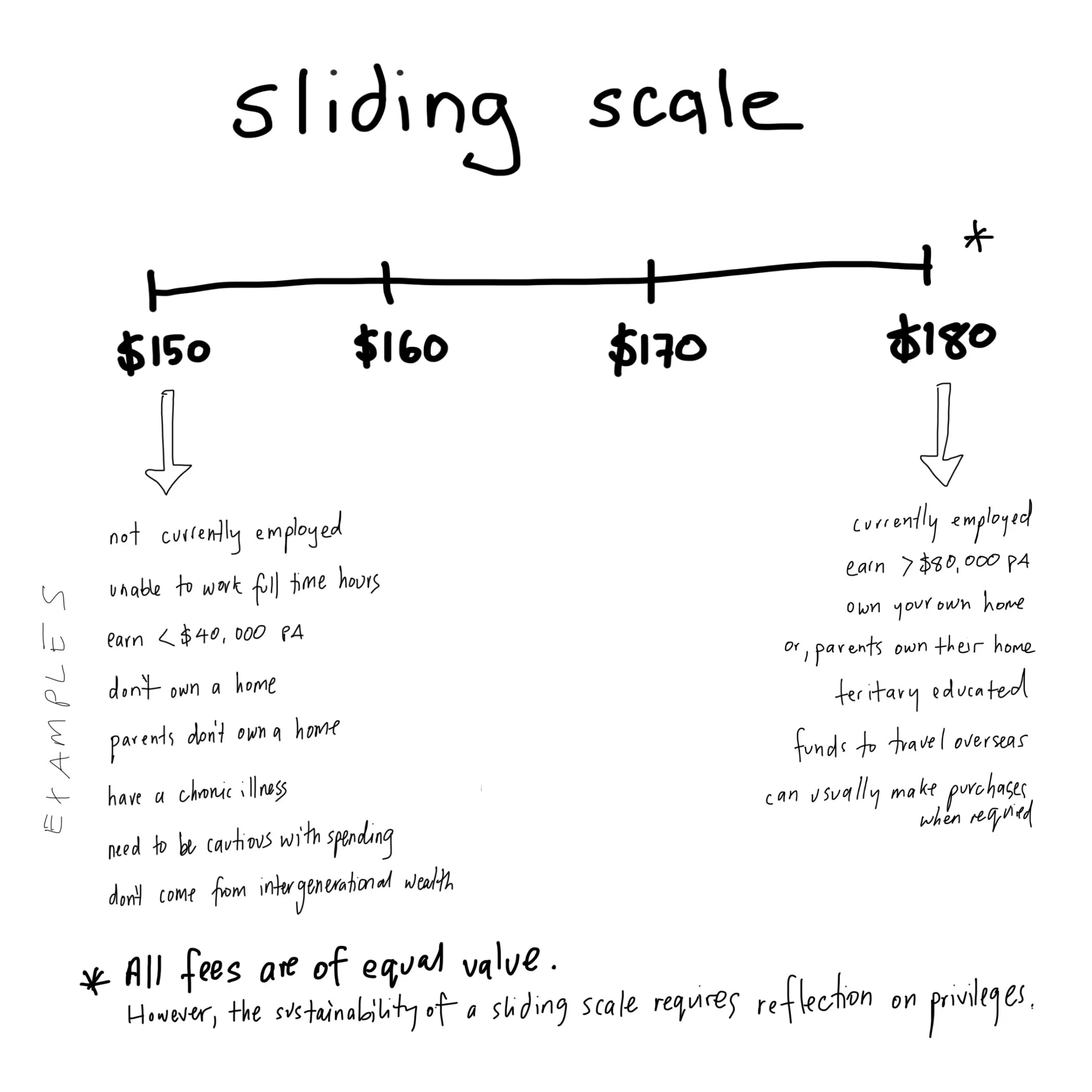Making psychological services accessible and affordable is important to Panda. To help ease the costs associated with mental health care, Panda provides sliding scale payment options (see below for more info on sliding scales). At Panda Cheong Psychology, fees are dependant on your individual circumstances (class, privilege, employment status) and what you are able to reasonably afford, while at the same time encouraging you to consider the value of the service provided. When deciding on the right fee, you will be asked to reflect across a number of factor, there a resources bellow to help guide you.
A standard psychology session runs for 50-60 minutes. 50 minutes is usually dedicated to counselling/therapy, while the remaining 10 minutes is for scheduling new appointments and for Panda to complete any admin (notes or sending resources).
Information about sliding scale fees
Sliding scale is a method of payment which recognises that not everyone is able to afford the same fee for services. It acknowledges that all people are still entitled to the same level/quality of service, regardless of their financial circumstances. Sliding scale payments aim to support people from different financial experiences, allowing all people access to services in more financially sustainable ways. Sliding Scales also relies on self reflection around class and privilege. Please take a look at the following blogs for some language and support around this:
Alexis Cunningfolk - The Sliding Scale: a tool for economic justice
Sliding scale presents clients with a range of possible fees, starting at the lowest price point, for example $150, then increasing incrementally to the highest price point, for example $180. Panda's sliding scale fee structure can be viewed below. It is up to the client to decide which price point will be appropriate for their financial situation. This is an individual decision, Panda will not be able to help you make this choice.
When considering which fee you will pay for psychological services, you may like to reflect on the following:
your current income - including your partner’s or family income.
your expenditure - including how much you prioritise other services like clothing, alcohol, cigarettes, tattoos, hair cuts etc.
sustainability of the fee - fees can always be renegotiated.
how often you plan to attend sessions
the value you place on the service - consider what you spend on other goods and services in your life.
what feels comfortable for you
The Australian Psychological Society recommends $246 for a 45-60 min session. Obviously these fees are well below this recommendation. Psychology fees cover the cost of service with also includes: rent, insurance, membership to regulating bodies and amenities. Panda will do their best to keep these costs low in order to provide a more accessible service.
Panda's sliding scale begins at 150$ to 180$ a session, see below:
Unfortunately Panda is unable to offer bulk billing options. Instead, they are a registered provider of Psychological Support Service (PSS). PSS is a free service funded through the Primary Health Network. To receive PSS funding certain eligibility criteria must be met, for example, peoples who are unemployed or experiencing significant financial difficulties and unable to afford the gap fee. See below for more details.
Payment
Payment can be made via cash, direct debit, credit card or EFTPOS at the time of your appointment.
Medicare Rebates and Gap Charges
Panda Cheong Psychology is registered as a Medicare provider under the 'Better Access to Mental Health' scheme. To become eligible for rebates a referral from a General Practitioner (GP) is required through the 'Enhanced Primary Care Plan'.
Under the Better Access to Mental Health Care Initiative you are entitled to a Medicare rebate of $93.35 for up to 10 sessions per calendar year, with a progress review required by your GP after 6 sessions. This means you only pay the gap between the rebate amount and the agreed upon fee, see the table below:
You will need to bring a referral letter and a Mental Health Care Plan to your first session. If this is all a bit overwhelming that's okay. Feel free to give Panda a call and they can talk you through the process.
You do not need to access the Medicare rebate to attend counselling. If you choose not to access the rebate, you do not need a referral letter to make an appointment.
Psychological Support Services
Panda Cheong is registered as a provider of Psychological Support Services (PSS), with the Lilly Pilly Consortium. PSS is funded by the Central Eastern Sydney Primary Health Network. PSS has been designed to support particular communities gain access to counselling services, this includes (but not limited to) First Nation peoples, peoples from “diverse” cultures, people with diverse genders or sexuality, people experiencing perinatal depression, people at risk of homelessness. PSS is a free service, so there are no out of pocket expenses or gap payments. When assessing PSS your GP will need to compete the appropriate referral, which will then be reviewed by the intake team at Central Eastern Sydney Primary Health Network for eligibility. For more information see Psychological Support Services.


